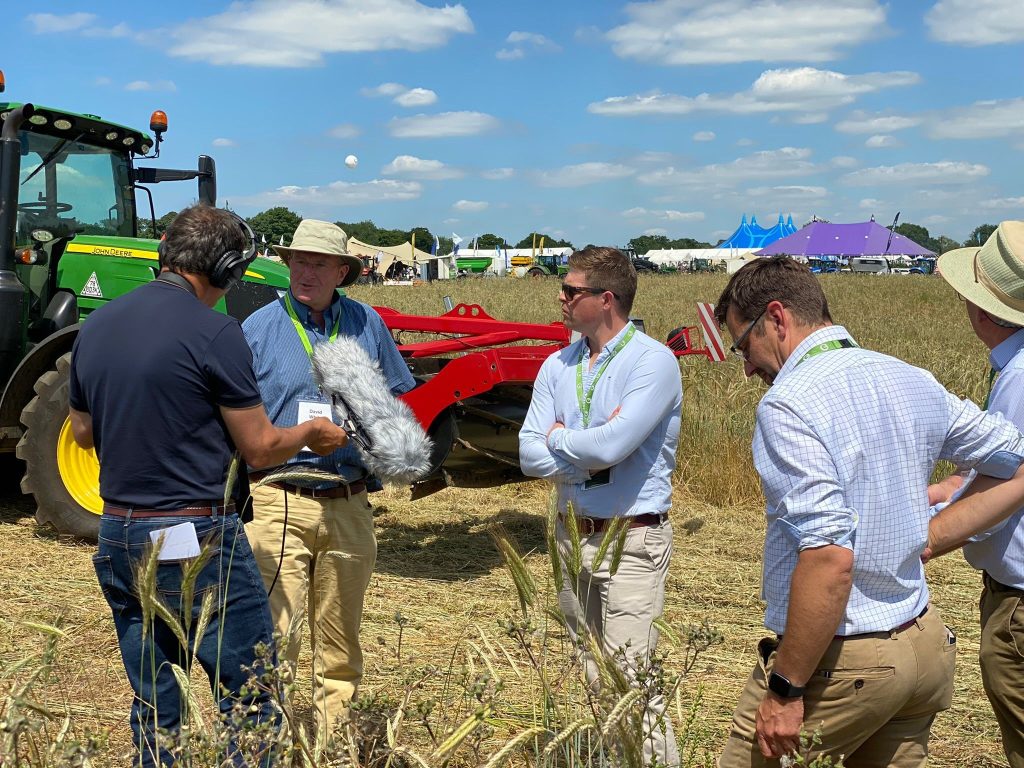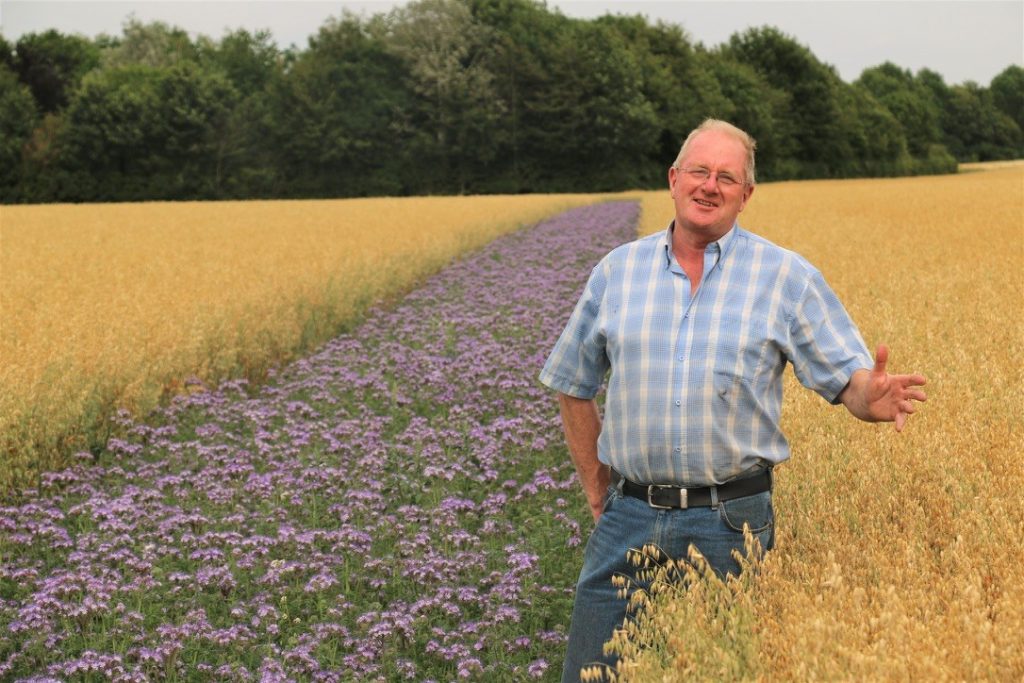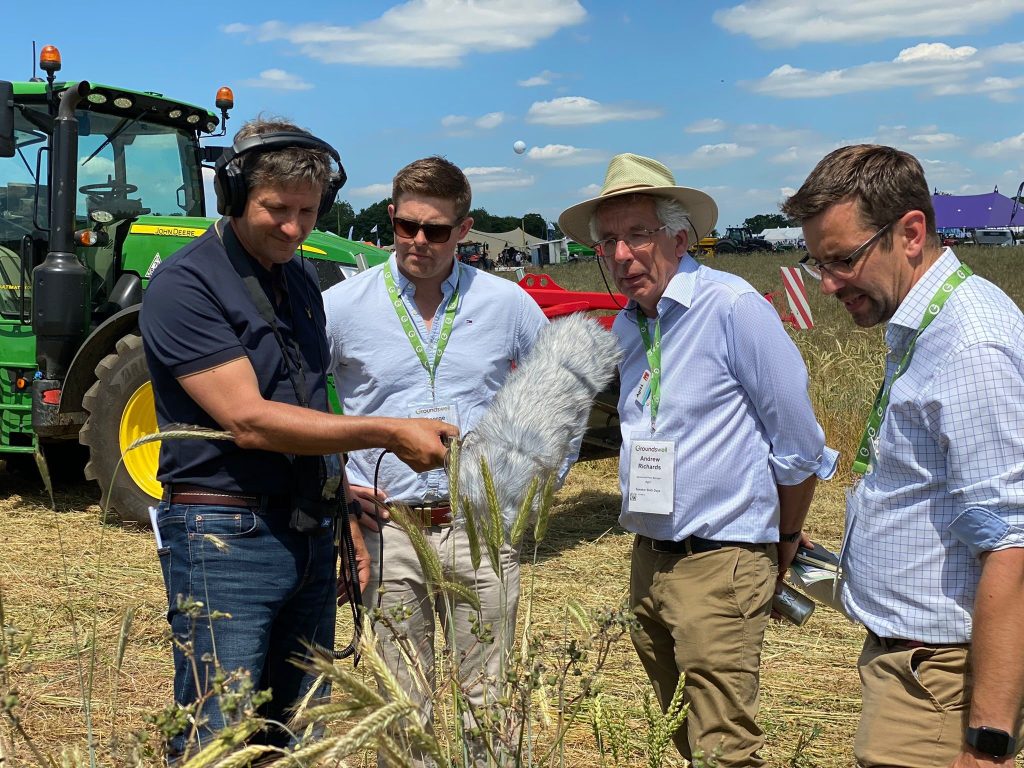Transitioning to more regenerative regimes hasn’t been entirely plain sailing for three growers with very different soils and situations who shared their experiences at a packed Agrii Green Horizons seminar at this year’s Groundswell.
However, they have all found their journey over the past 6-8 years very positive and are increasingly profiting from moving less soil, protecting its surface, keeping roots in the ground and diversifying their cropping.
While their goals are very similar, the way the growers have gone about achieving them reflect clear differences in the balance each has to strike between long-term sustainability gain and short-term profitability need.
On his mostly light 160ha at Hawkmill Farm just to the east of Cambridge, David White’s principal stakeholders are his family. This and his determination to ‘wean himself off the comfort blanket of cultivation as soon as possible’ led him to switch from full to no-till in a single, bold step in 2015.
Since then, he has been experimenting at scale with a whole host of regenerative opportunities, including a vast range of cover cropping mixes and management methods; early drilling and a variety of OSR companion crops to combat cabbage stem flea beetle; and, most recently, bi-cropped beans and oats – both winter and spring.
At Revesby Estate near Horncastle in Lincolnshire, farms manager Peter Cartwright has been moving more steadily but very deliberately towards no-till across the Wiggins-Davies family’s 1100 cropped hectares since 2014.
Getting the basics working correctly, keeping things simple at the start and building on carefully trialled experience with a firm goal in mind has been his recipe for success to meet the business’ need for parallel improvements in profitability and sustainability.
Farming around 1000ha under a variety of agreements across a vast range of soil types, George Fraser of Shaftesbury-based farming and contracting business, A&R Fraser has had to be even more cautious in his regenerative transition.
Six years ago, he and his family started developing their well-established business to be the no-till contract farmer and contractor of choice in the North Dorset/south Wiltshire area. With short-term performance at least as important as long-term improvement to their customers, they have done this by perfecting their approach on their own land before extending it more widely in the most appropriate ways.

“In stepping up our soil biology to reduce our reliance on inputs our shoulders have had to be broad enough to take a good amount of criticism for farming ugly,” said David White. “We have made our fair share of mistakes along the way. Not least by failing to follow the biological rules and trying to do the same thing twice – like growing wheat after wheat.
“We have been surprised at how quickly soil biology can start working much better when you look after it and encourage it to proliferate. Working with nature rather than trying to force the soil with big, heavy machines has seen our soil structure and health come on by leaps and bounds.
“Amongst other things, both shallow working and deep burrowing earthworm numbers have built-up really rapidly. Keeping the land green the year round with catch and cover crops has been very useful in capturing nutrition. And drilling directly into them with the least possible soil disturbance has also helped capture carbon.
“We are finding many ways to farm both more sustainably and profitably. The bi-crop of spring oats and spring beans we tried last year, for instance, performed handsomely with no in-crop herbicides, fungicides or fertiliser at all. The two species complemented each other extremely well, generating a much higher margin than the traditional bean crop we grew alongside it.
“Higher seed rates and the right soil structure mean we are increasingly able to employ crop competition in place of herbicides to deal with weeds,” David added. “We need much less tractor horsepower these days, and work our tractors for around a quarter the time we used to. This means they last longer and we at least halve our diesel usage.
“Our soils are far more resilient to both drought and heavy rainfall too. At the same time, the amount and diversity of wildlife we have on the farm these days is a joy to see.”
Since moving from minimum tillage with rotational ploughing to almost entirely no-till cropping over the past eight years, Peter Cartwright has also seen huge improvements in the workability, resilience and health of soils with up to 40% clay and 40% silt at Revesby Farms.
Over this time, he has almost halved diesel usage and substantially reduced labour needs while increasing average wheat yields by 1t/ha; not to mention getting to grips with horrendous blackgrass problems.
“Our transition was actually prompted by the need to deal with levels of blackgrass that made some of our land almost uncroppable,” he explained. “Following the Stow Longa recipe, we introduced up to three consecutive years of spring cropping, concentrated on moving as little soil as possible at drilling and employed the most competitive wheat varieties at high seed rates drilled as late as possible in the autumn.

“The rotational change led us to trial a range of cover cropping options and we now grow around 450ha of winter covers a year. We first ventured into direct drilling with a tined Horsch Sprinter, to which we have just added an Avatar drill now our soils are in good enough condition. We trialled the prototype Avatar back in 2016 and knew this would be ideal for our needs once we were in a position to make the most of its disc coulter system.”
Two different types of direct drill these days gives the Revesby team the flexibility they need to deal with different soil conditions, trash levels and the weather. Over 90% of their crops are now drilled without cultivation, and the capacity to drill all their winter wheat in 5-6 days reduces both their weather risk and need to travel when the conditions aren’t right.
Alongside moving the least possible soil under the most favourable ground conditions, moving to their own version of Controlled Traffic Farming has made a big difference to the physical as well as biological health of their soils.
“Everything is coming together so well now that I think we should be able to push our wheat yields up another 1t/ha over the coming four years,” suggested Peter Cartwright.
“With hindsight, we should have been braver and cut down our cultivations sooner. And we certainly shouldn’t have invested in the Horsch Cruiser cultivator we have hardly needed to use since the day it arrived because our soil condition improved so much..
“Getting the basics of both drainage and black-grass management right before moving too wholeheartedly into no-till have been essential to our success. As have been attention to detail, working towards a clear goal, and careful trialling under our own conditions in a scientific way as an Agrii Technology Centre.”
Improving drainage and soil structure to enable the most successful direct drilling have been as important in the Fraser family’s transition from traditional plough and min till cropping to the regenerative regime they now employ on more than 80% of their farmed land.
They are also being able to successfully extend this experience to their contracting operations to provide the resource and experience needed to help more West Country growers benefit from soil-first management.
“We have found digging soil pits everywhere to assess soil condition and carefully targeted low disturbance subsoiling and mole-ploughing to sort out any inadequacies a crucial first step,” George Fraser stressed. “With our agronomist, we also plan everything on the basis of full soil testing, repeated every four years to monitor changes.
“We really benefit from being large enough to run several different types – including a Weaving GD, Amazone Cayena and Weaving Sabre Tine – so we can match the kit we use closely to soil needs and condition. The substantial slurry, muck and digestate service that is part of our family business has been great fit with our organic matter-building focus too.

“Contract farming means we can’t afford to be evangelical about our system. So, where ground needs subsoiling it gets it; where trash causes slug problems we stubble rake; and everything we put into our cover crops is there for a particular economic as well as environmental reason.
“Like David and Peter, we have seen great improvements in the health, vitality and workability of our soils in a relatively short time without compromising crop performance,” he reported.
“Wider rotations are giving us more flexibility to adapt to conditions as well as greater biodiversity. Cover crops are helping condition soils and build organic matter while providing late-season wildlife food and shelter. And better plant health through healthier soils and more balanced nutrition is taking the pressure off sprays programmes at just the time we need it with the loss of so much chemistry.
“Moving to no-till is far from a panacea and it’s all too easy to make mistakes; especially where them likes of brome as well as blackgrass are problematic. But we have no doubt that integrating the most appropriate regenerative techniques into our business with attention to detail and the best-informed advice has to be the way ahead.”


